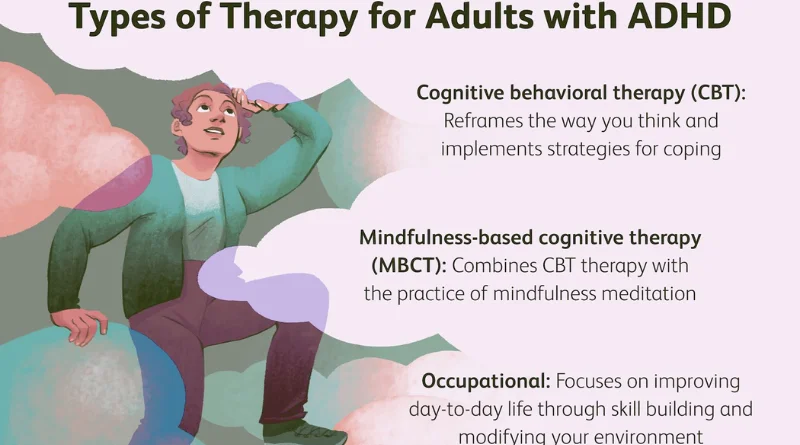Decoding Adult ADHD: Navigating Challenges in the Digital Age
INTRODUCTION:
Embark on a digital exploration as we unveil the intricate relationship between prolonged smartphone use and the surging prevalence of adult Attention Deficit Hyperactivity Disorder (ADHD). Delving into the latest research, this discussion sheds light on how smartphones may contribute to the rise of ADHD in adults, prompting a closer look at the evolving dynamics of mental health in the digital era. Stay tuned for actionable insights and practical strategies to navigate the smartphone-driven landscape while prioritizing cognitive well-being. Join us on this journey to cultivate mindfulness in the digital age.
Smartphones and the Rising Tide of Adult ADHD:
The surge in adult Attention Deficit Hyperactivity Disorder (ADHD) raises concerns, with researchers suggesting smartphones might be a contributing factor. As doctors grapple with understanding whether the increase is due to improved screening or environmental influences, a study in the Journal of the American Medical Association indicates a 10% higher risk for those using smartphones two hours or more daily.
- ADHD on the Rise: The traditionally childhood-associated disorder is growing among adults, sparking investigations into potential causes.
- Smartphone Usage Connection: A Journal of the American Medical Association study links increased ADHD risk to prolonged smartphone use.
As the ADHD prevalence climbs globally, the role of smartphones in this epidemic is becoming a focal point for researchers.
Smartphone Distractions: A Modern ADHD Catalyst
The digital age’s incessant distractions, fueled by smartphones, contribute to an adult ADHD epidemic. While ADHD has historically been viewed as a genetic disorder, lifestyle changes, especially smartphone reliance, are now being considered as potential contributors to acquiring the disorder later in life.
- Multitasking Challenges: Society’s push for constant multitasking may lead to screen addiction and a shorter attention span.
- Smartphone-Induced Distractions: Constant smartphone use, driven by social media and other apps, prevents the brain from resting in default mode.
Experts weigh in on the possibility of acquired attention deficit due to the relentless distractions posed by smartphone culture.
The Evolving Landscape of ADHD: From Genetic to Acquired
The historical perception of ADHD as a purely genetic disorder is evolving, with researchers suggesting that lifestyle factors, notably smartphone habits, may contribute to its development in adulthood. As the number of diagnosed adults worldwide increases, the impact of technology on brain function and behavior comes under scrutiny.
- Lifestyle Influence: Lifestyle changes, including heavy smartphone use, are considered potential contributors to acquired ADHD.
- Global ADHD Statistics: The surge in adult ADHD diagnoses worldwide prompts a reevaluation of the disorder’s origins.
Researchers delve into evidence highlighting the role of technology in influencing ADHD symptoms and disrupting various aspects of life.
Navigating a Balanced Digital Lifestyle: Mitigating ADHD Risks
Acknowledging the potential risks posed by extended smartphone use, experts recommend cultivating a healthy relationship with technology to mitigate the unwanted side effects. Practical steps, such as setting phone time limits and taking breaks away from technology, are essential for maintaining mental well-being in the digital age.
- Developing a Healthy Relationship: Individuals are encouraged to establish a balanced connection with their smartphones.
- Tech-Free Rest Time: Setting limits and taking breaks away from technology is crucial for preventing the unwanted consequences of smartphone overuse.
In the quest for a balanced digital lifestyle, understanding the intricate relationship between smartphones and ADHD becomes paramount for readers seeking to safeguard their cognitive well-being.
Mitigating ADHD Risks in a Smartphone-Driven World

In an era dominated by smartphones, the increasing prevalence of adult Attention Deficit Hyperactivity Disorder (ADHD) is drawing attention to the potential role of technology in its rise. As researchers explore whether this surge is a result of improved screening or a consequence of environmental and behavioral factors, the connection between prolonged smartphone use and a heightened risk of ADHD becomes more evident.
Smartphone Use and ADHD:
- The Modern ADHD Landscape: Adult ADHD, once primarily associated with childhood, is now a growing concern globally, prompting a reevaluation of its origins.
- Smartphone Influence: Studies, including one in the Journal of the American Medical Association, underline a 10% higher risk of ADHD in individuals using smartphones for two or more hours daily.
Digital Distractions: Fueling an Adult ADHD Epidemic
- Beyond Genetics: Traditionally viewed as a genetic disorder, ADHD is now examined through the lens of lifestyle choices, with smartphones identified as potential catalysts.
- Constant Multitasking: Societal expectations for constant multitasking may contribute to screen addiction and a compromised attention span.
From Genetic Predisposition to Acquired ADHD:
- Lifestyle Contributions: Lifestyle changes, particularly the reliance on smartphones, are challenging the traditional notion of ADHD as solely genetic.
- Global Diagnoses Surge: The increasing number of adult ADHD diagnoses globally prompts a closer examination of the evolving landscape of this neurodevelopmental condition.
Navigating a Balanced Digital Lifestyle: Practical Solutions
- Mitigating Smartphone Risks: Acknowledging the potential link between smartphones and ADHD, experts recommend cultivating a balanced relationship with technology.
- Setting Boundaries: Practical steps, such as setting time limits on smartphone use and taking intentional breaks from technology, are crucial for preventing unwanted side effects.
In a world where digital engagement is ubiquitous, understanding the nuanced relationship between smartphones and ADHD is essential for individuals seeking to safeguard their cognitive well-being. As the conversation around the impact of technology on mental health continues, adopting a mindful and intentional approach to smartphone usage emerges as a key strategy for maintaining a balanced and focused life in the digital age.
Strategies for a Mindful Digital Lifestyle

As the correlation between prolonged smartphone use and the rise of adult Attention Deficit Hyperactivity Disorder (ADHD) unfolds. The imperative to foster mental wellness in the digital age becomes increasingly evident. This discussion delves deeper into practical strategies. Shedding light on how individuals can navigate the smartphone-driven landscape while safeguarding their cognitive resilience.
1. Mindful Engagement: Redefining Smartphone Interaction
- Intentional Awareness: Cultivate a heightened awareness of smartphone usage, focusing on the purpose and duration of each interaction.
- Digital Detox Moments: Incorporate regular breaks from technology to allow the brain to recalibrate and prevent continuous cognitive strain.
2. Tech-Free Zones: Establishing Boundaries for Balance
- Designated Spaces: Create areas in living or workspaces where smartphones are intentionally not allowed, fostering environments conducive to focused tasks.
- Dedicated Rest Time: Set specific timeframes during the day for uninterrupted rest away from smartphones to encourage mental rejuvenation.
3. Strategic Time Management: Setting Limits for Screen Time
- Defined Usage Windows: Allocate specific time slots for smartphone activities, ensuring they don’t encroach upon crucial work or relaxation periods.
- Utilize Smartphone Features: Leverage built-in tools and apps that enable users to set limits on screen time. Aiding in the establishment of healthy usage patterns.
4. Tech-Free Social Interaction: Prioritizing Face-to-Face Connections
- Conscious Socializing: Strive for in-person interactions, fostering deeper connections and reducing reliance on digital communication.
- Unplug During Gatherings: Encourage tech-free zones during social events to enhance the quality of personal engagements.
Embracing a Mindful Tech Lifestyle: A Personal Responsibility
In the relentless march of technological progress, individuals stand at the forefront of crafting their digital destinies. Recognizing the potential implications of extended smartphone use on mental health. The onus lies on each person to adopt a mindful approach to technology. By implementing these strategies, individuals not only mitigate the risks of smartphone-induced ADHD. But also foster a more intentional and balanced relationship with the digital world. As we navigate the intricate dance between smartphones and cognitive well-being. Cultivating resilience becomes not just a goal but a continuous journey toward a harmonious digital life.
Smartphone Overuse and Cognitive Health Risks
In a digital age dominated by smartphones, researchers issue a stark warning about the potential hazards associated with prolonged device use. Spending just two hours a day on mobile devices may pose risks to cognitive health. With reports linking extended smartphone usage to a heightened risk of Attention Deficit Hyperactivity Disorder (ADHD) in adults.
- Reduced Cognitive Activity: Extended smartphone use, specifically two hours daily, has been correlated with diminished cognitive activity and attention, highlighting potential risks to mental well-being.
- Growing ADHD Concerns: The study emphasizes a surge in adults affected by ADHD. Prompting investigations into whether smartphones contribute to this trend. A recent Journal of the American Medical Association study notes a 10% increased likelihood of attention deficit disorders in those using smartphones for two or more hours daily.
As the prevalence of ADHD in youth rises, researchers explore whether it’s solely due to improved screening or influenced by environmental and behavioral factors during adolescence.
Digital Distractions and Youth ADHD
Amid the rise of digital distractions, especially prevalent among younger generations, concerns emerge about the impact on attention disorders in children. While doctors suggest that these issues may resolve as children grow older. The constant engagement with social media, text messages, and digital content could contribute to the development of ADHD.
- Potential Resolution with Age: Doctors believe that the ADHD-related challenges linked to heavy smartphone usage might naturally resolve as children mature.
- Role of Digital Distractions: Social media, streaming services, and constant connectivity are identified as potential contributors to attention-related disorders in children.
Researchers question whether heavy online usage is a consequence of ADHD, prompting a closer examination of the relationship between technology engagement and neurological impairments.
Smartphone Use and Attention Disorders:
Delving into the intricate relationship between ADHD and online usage. Experts ponder whether individuals become heavy online users due to pre-existing ADHD. Elias Abu Jawad, a psychology expert from Stanford University. Raises this thought-provoking question as scientists seek to unravel the intricate connections between technology engagement and neurological impairments.
- Longstanding Connection: Abu Jawad emphasizes the long-standing connection between ADHD and heavy online usage, sparking a crucial inquiry into the causation dynamics.
- ADHD as a Neurological Impairment: ADHD is defined as a neurological impairment with far-reaching effects on attention, daily busyness, and overall quality of life.
Navigating the Digital Age: Balancing Mental Health
As technology continues its pervasive role in our lives, understanding and addressing the implications of extended smartphone use become paramount for maintaining a healthy cognitive balance in the digital age. Researchers stress the need for heightened awareness and responsible usage. Urging individuals to manage their digital engagement to safeguard mental well-being.
- Consequences of Digital Overload: The study underscores the potential consequences of prolonged smartphone use on mental health, particularly attention disorders.
- Call for Responsible Technology Use: In the face of growing concerns, researchers advocate for a nuanced approach to technology, emphasizing the importance of responsible smartphone use for a sustainable cognitive balance.
“As we conclude this mrprecious journey, immerse yourself in the latest Mr precious wonders across tech, Gemstones, sports, Cars, Quotes, and health. From groundbreaking tech trends to captivating, thrilling sports moments, and essential health insights, Mr preciousis your ultimate destination. So, until our next Mr precious update, stay mrprecious. Stay engaged, and keep thriving in the dynamic world of Mr precious Innovations!”

